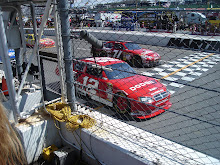I realize on Tuesday I wrote that former Atlanta Falcons quarterback Michael Vick deserved a second chance in the NFL once his prison sentence officially ended in July (he was released from prison into home confinement on Wednesday). But the more I think about Vick's situation, and the opinions on both sides of the argument, I'm not so sure.
I'm still of the mindset that everyone deserves a second chance after paying their debt to society. Whether you agree with his sentence or believe it should've been stricter, the fact remains that come July, Vick will be a free man in the eyes of America's justice system. While that means certain rights will forever be lost to him -- like the right to vote -- his right to earn a living will never go away.
So by that logic, the law cannot keep Vick out of the NFL. Commissioner Roger Goodell can, though, and he would be well within his rights if he decided to slap a lifetime ban on the former Virginia Tech star. The NFL is a private corporation, and Goodell issuing a lifetime ban would be no different than your boss firing you after you were convicted of a felony.
In some regard, a lifetime ban from the NFL would hold more weight, since the league is so high-profile and its athletes are often seen a role models. It's one thing if Joe the Plumber served two years for a drug charge, then came back and got a job building houses and apartment buildings. It's another thing entirely when a multimillionaire athlete goes to jail for two years, only to return to the fields and national TV broadcasts for everyone to see.
Whether people like Charles Barkley like it or not, professional athletes are role models. Children look up to athletes, quarterbacks in particular, and that would raise a serious moral dilemma should Goodell reinstate Vick. Would you want your child rooting for a convicted felon?
Then again, this would provide a wonderful opportunity for parents to step in and teach their children about consequences. Use Vick as an example of someone who committed a horrible act, broke the law and paid the price for it. If Vick returns to the league a new man, use that as a chance to tell your child about a person's quest for redemption and teach them the values relevant therein.
There are those who believe that while Vick is entitled to earn a living once he completes his sentence, he should do so out of the public eye. Vick will be working a $10-an-hour construction job during his two months in home confinement, and there are those who would like to see that become his permanent occupation once he's a free man. It's a fair argument, because they're not denying Vick his right to earn a living at all.
If I had to guess, I'd posit that Goodell might suspend Vick for the entire 2009 season (Vick's suspension is currently indefinite), while gauging Vick's words and deeds over that time. If Goodell deems Vick is remorseful and on a redemptive path, only then would be lift the suspension and make the quarterback eligible in 2010. Then the Falcons would have to release him before another team would take a chance in signing him.
And it would be a chance, one I'm guessing most teams won't be willing to take.
There's also the reality that even once Vick's legal penance is paid, he'll still be paying a price. Say Vick returns to the NFL and a team signs him; the public relations backlash won't affect just the team in question. A large portion of the venom and criticism will be directed at Vick. Every time his team goes on the road, the fans will let him hear it. PETA and other animal rights groups will continue to protest Vick everywhere he goes, and no matter what Vick does from this day forward, he will likely face the reality of his atrocities everywhere he looks.
If Vick truly does commit himself to being reformed, that will carry with it a certain amount of guilt and emotional baggage. Whether he finds solace in faith or another avenue, the reality of what he and his friends did to those dogs will live with him forever, regardless of whether or not he plays in the NFL. If Vick has any sort of conscience, he'll probably spend some sleepless nights reliving his atrocities.
If Vick winds up working outside of the NFL, his crime will stare him in the face every time he applies for a new job. Job applications ask if a prospective employee is a convicted felon, and if so, offers the applicant a chance to explain the situation. If Vick finds himself filling out job applications like a regular person, he'll face that reality over and over again.
That in itself is a hefty punishment. The law might consider Vick a free man in a few months, but he'll never be free of himself.
A Brutal, Devastating Reminder
14 years ago


No comments:
Post a Comment